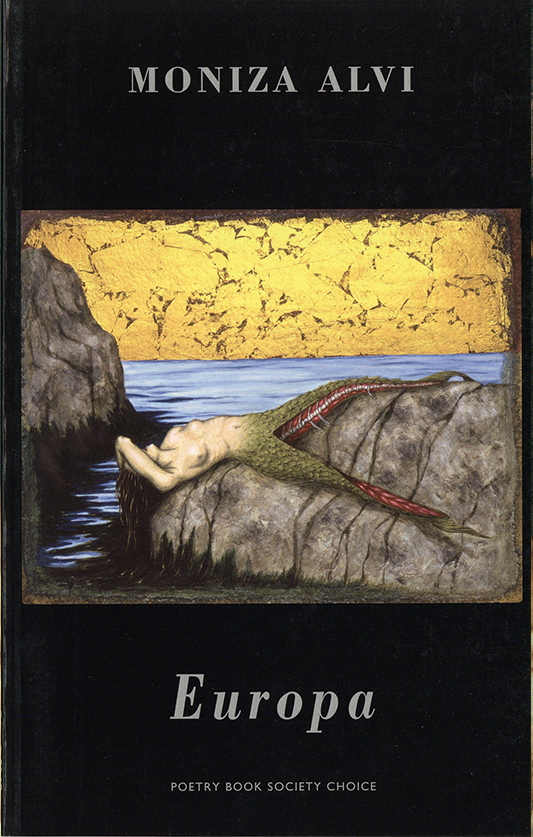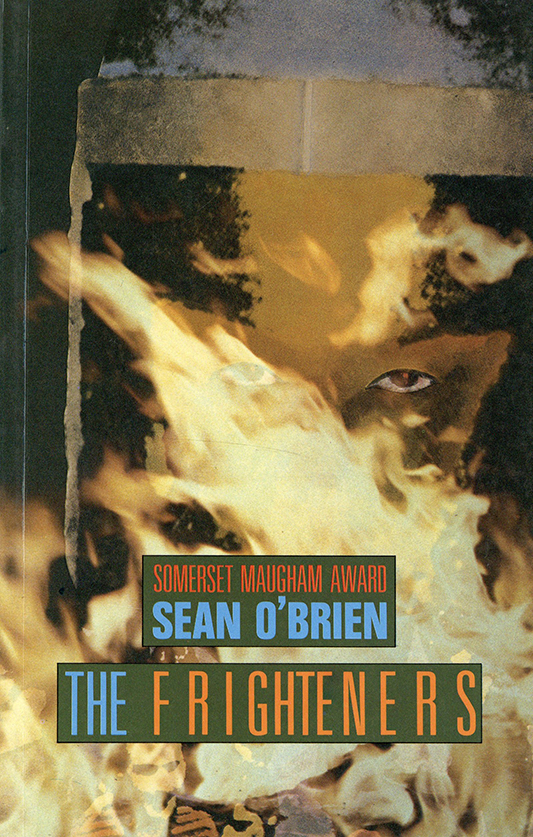To coincide with ‘Transformations: Newcastle Poetry Festival 2019‘, which ran from 1st-4th May 2019, Special Collections and Archives showcased Contemporary Poetry Collections: Poets and their Archives, using material from our recently acquired and catalogued contemporary poetry archives. Material from the archives of poets Sean O’Brien, Jack Mapanje, Selima Hill, Peter Bennet and Moniza Alvi were on display to provide an insight into the varied voices of contemporary poetry and literary archives held by Newcastle University Special Collections. 
Poets from the exhibition are highlighted below;
Moniza Alvi
Moniza Alvi was born in Lahore, Pakistan, and came to England when she was a few months old. She grew up in Hertfordshire and studied at the Universities of York and London. After working for many years as a secondary school teacher, she is now a freelance writer and tutor.
Alvi’s poetical career was launched after winning the Poetry Business Prize in 1991, a prize she won jointly with fellow poet Peter Daniels. Her first independent collection, The Country at My Shoulder (1993), was shortlisted for the T.S. Eliot Prize and the Whitbread Poetry Award. She has since published seven further collections of poetry with Oxford University Press and subsequently Bloodaxe Books. Alvi received a prestigious Cholmondeley Award in 2002.
The themes of Alvi’s work are often those of duality, division, identity and feminism.
An Unsafe Subject. Trauma is the central theme of ‘Europa’, Alvi’s 2008 collection, in particular the trauma of rape.
This is explored in Alvi’s re-imagining of the Greek myth of the rape of the beautiful Europa by Zeus (chief of gods).
Following the publication, Alvi was asked to write the foreword to Feminism, Literature and Rape Narratives. Here, Alvi considers how rape is still often considered a taboo subject and explores whether this is a result of rape being primarily considered a women’s issue.
Poetry in Progress. Pages from Alvi’s notebook and draft typescript provide an insight into Alvi’s writing process of ‘At the Time of Partition’ (2013). This was Alvi’s first new poetry book since her T.S. Elliot Prize shortlisted collection ‘Europa’ (2008).
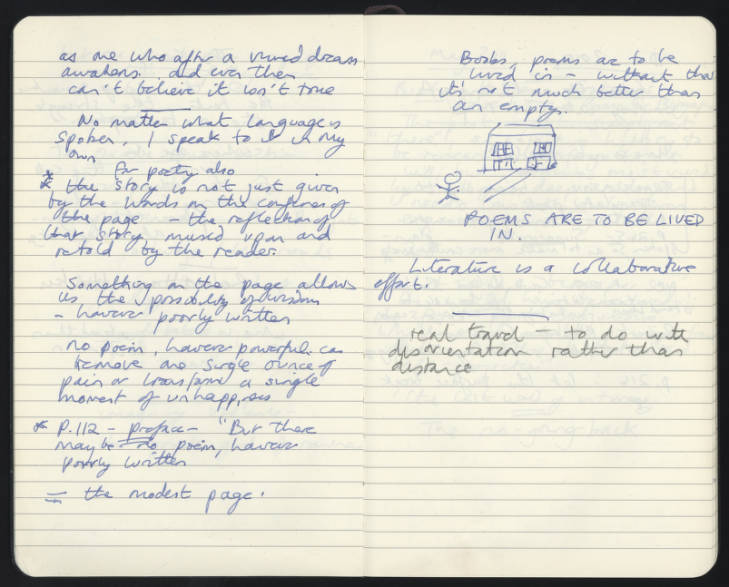
Pages from notebook containing notes, poetical sketches and drafts, poetical ideas and suggestions for the creative process. Alvi (Moniza) Alvi, ALV/5/1
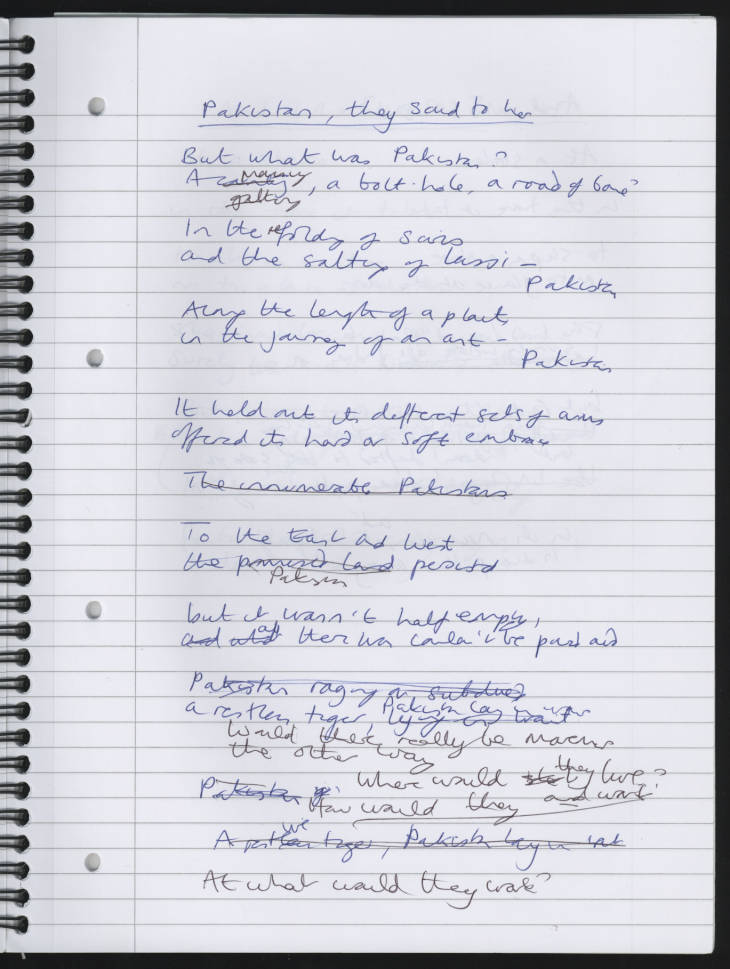
Page from a manuscript draft of ‘At the Time of the Partition’ including comments. Alvi (Moniza) Archive, ALV/1/1/1/2
Peter Bennet
Peter Bennet was born in Staffordshire in 1942. He won a scholarship to King’s School Macclesfield before attending Manchester College of Art and Design where he studied art. He then went on to teach art in secondary schools.
Later, Bennet worked with around 1000 redundant steelworkers following the closure of Consett Steel Works. The job was to teach basic English, which evolved into exploring literature. This exploration and experience was to kick start Bennet’s writing career.
Bennet has published poetry collections with Bloodaxe Books and Flambard Press. He has received major awards from New Writing North and Arts Council England, and has won numerous poetry competitions.
Bennet’s themes include folklore, legend and transformation – inspired by living off-grid in the ‘Wilds of Wanney’, Northumberland, for thirty-three years. Below are some items from the Bennet (Peter) Archive.
Inspired by the Landscape.
Much of Bennet’s work was inspired by his surroundings. “Snow at Fourlawshill Top” references the Wanney Hills, which was Bennet’s home for many years.
Hareshaw Linn is one of Northumberland’s most spectacular waterfalls. It is also a Site of Scientific Interest for its rare ferns and lichens.

Pages from notebook containing Drafts of Poems, including drafts of Hareshaw Linn, 1985. Bennet (Peter) Archive, PB/1/5/1
‘Sir John Fenwick’s Skull’ – Award Winning Poem.
Early versions of ‘Sir John Fenwick’s Skull’ poem give a snapshot of how it evolved into the winner of the Basil Bunting prize.
Sir John Fenwick’s skull and helmet, the inspiration for the poem, were returned to Hexham Abbey following his death at the Battle of Marston Moor (1644). The skull is currently on display at Hexham Old Gaol.

‘Sir John Fenwick’s Skull’ – Final version, 1987. Bennet (Peter) Archive, PB/6
Jack Mapanje
Jack Mapanje was born in Malawi in 1944. He worked as a secondary school teacher before moving to the University of Malawi, first as a lecturer and then as Head of English.
Mapanje began writing poetry out of despair at the political situation in his homeland, an authoritarian one-party state. His first poetry collection, Of Chameleons and Gods, was published in the UK in 1981, winning critical acclaim around the world. It was ‘withdrawn from circulation’ in Malawi by the governing dictatorship in 1985.
He was arrested in 1987 and detained without charge or trial. During his incarceration, Mapanje continued to compose poetry, but denied access to pen and paper, he crafted most of these poems in his head. On occasion, Mapanje was able to write poems on toilet roll, soap packets or similar scraps – which were then smuggled out of prison. After numerous international campaigns, Mapanje was finally released after 3 years, 7 months and 16 days with no explanation.
His next two volumes of work, The Chattering Wagtails of Mikuyu Prison (1993) and Skipping without Ropes (1998), were largely composed during his time in prison.
Poems from Prison. The majority of poems in the Mapanje (Jack) Archive were composed during his incarceration. As pen and paper were forbidden, these poems were mainly created and crafted in Mapanje’s head, often coming back into his consciousness after his release. Letters and poems were often also written on toilet paper, such as the below letter from Jack Mapanje to David Kerr.
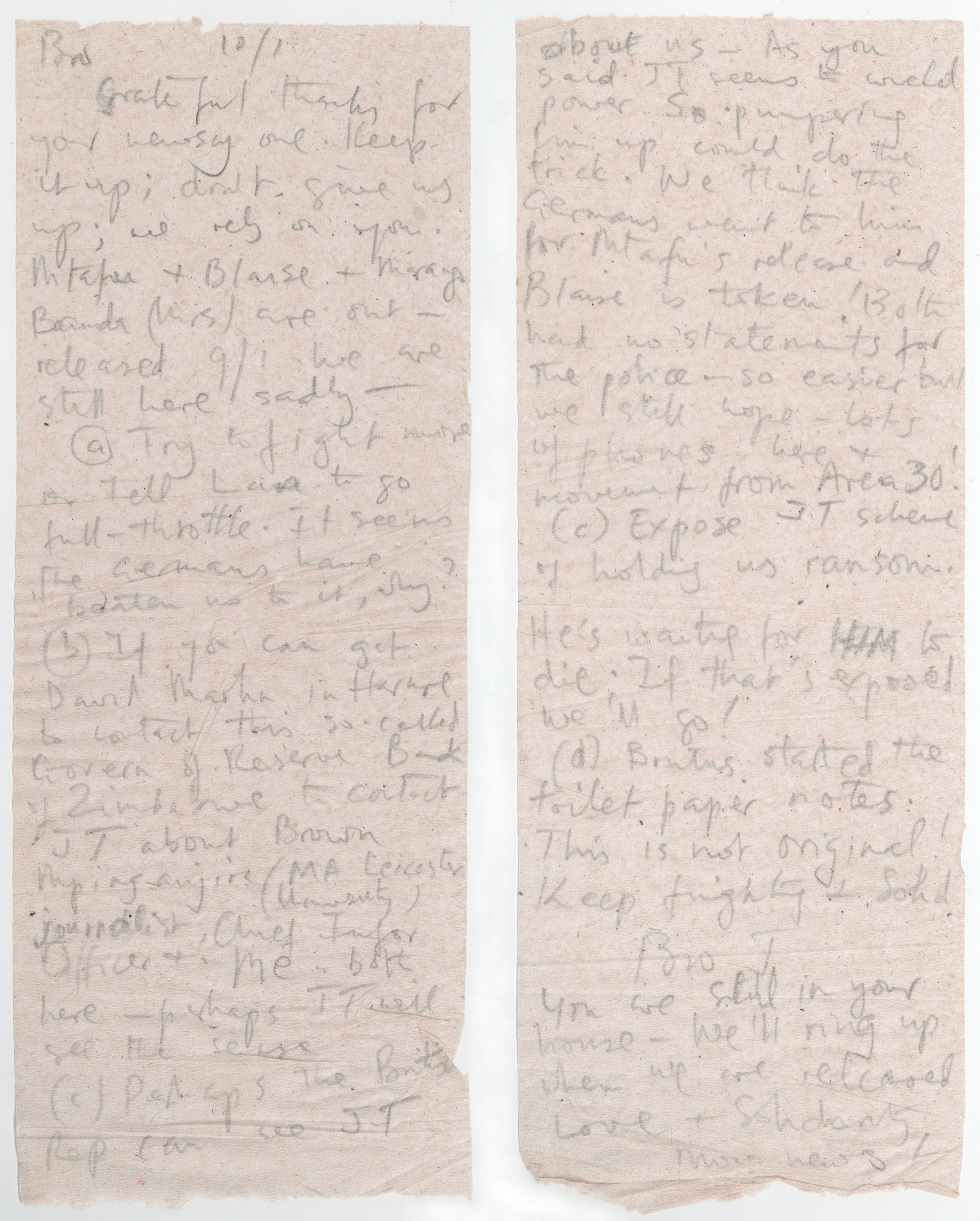
Extract from a letter written by Jack Mapanje to David Kerr whilst a prisoner in Mikuyu Prison in Malawi. Mapanje (Jack) Archive, MAP/6/3/43
During his time in prison, Mapanje wrote his second collection of poetry, ‘The Chattery Wagtails of Mikuyu Prison’ (1993), and much of his third, ‘Skipping without Rope’ (1998).
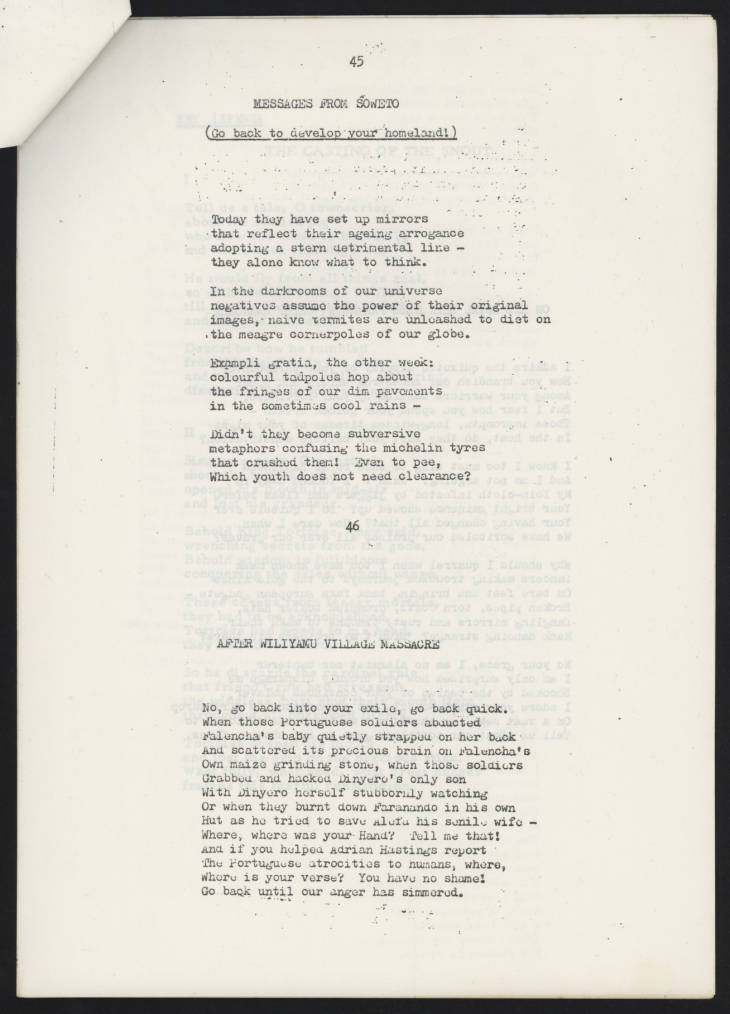
Page from a typescript draft of ‘The Chattering Wagtails of Mikuyu Prison’, which includes drafts of two poems included in the collection. Mapanje (Jack) Archive, MAP/2/8/3
Selima Hill
Selima Hill was born into a family of painters in 1945 and grew up in rural England and Wales. She later attended boarding school before winning a scholarship to study Moral Sciences at Cambridge. After marrying and starting a family, Hill published her first collection of poetry, Saying Hello at the Station (1984).
She has won the Cholmondeley Award and the Arvon International Poetry Competition. Her collection Violet (1997) was shortlisted for three British poetry awards, and Bunny (2001) won her the Whitbread Poetry Award.
As well as writing poetry, Hill has worked on a variety of multimedia projects including collaborations with the Royal Ballet, Welsh National Opera, Science Museum and Imperial War Museum.
Hill has also taught creative writing in hospitals and prisons, and was Writer in Residence at the Royal Festival Hall.
Hill’s themes include mental health issues, sexual abuse and family conflicts, often written in a surrealist style.
The Hill Method (Hill (Selima) Archive, SH/8/4). This was a creative way Hill invented to write a poem – it’s definitely worth a try! Her notebooks, like many of the poets featured here in this post, give an insight into Hill’s creative process – often including notes, drawings, collages and personal reflections.
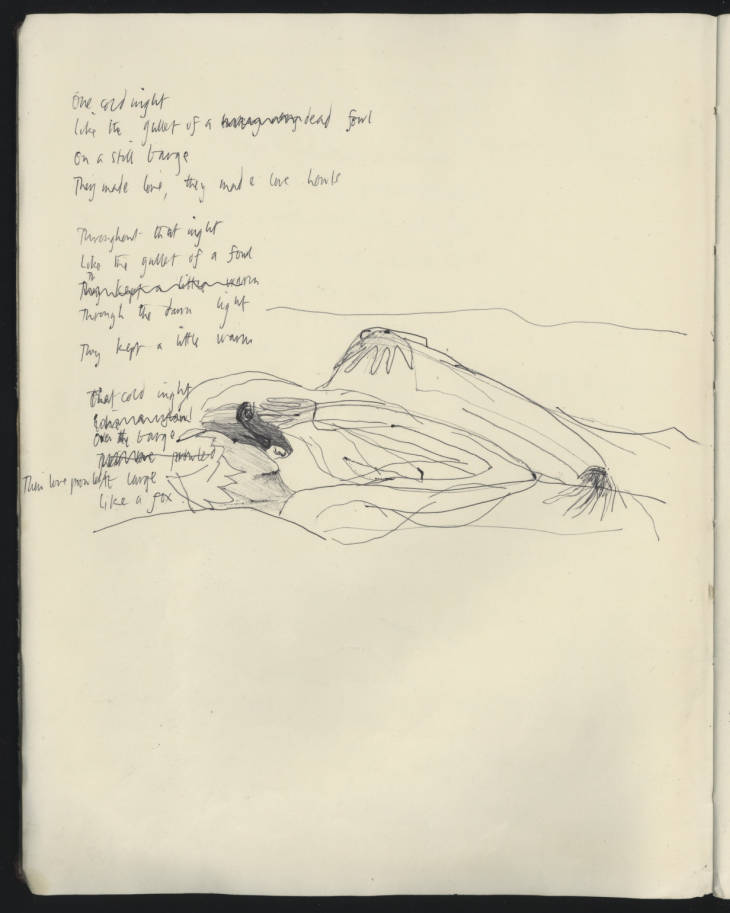
Page from a notebook containing poems, notes, drawings and personal reflections. Hill (Selima) Archive, SH/4/10
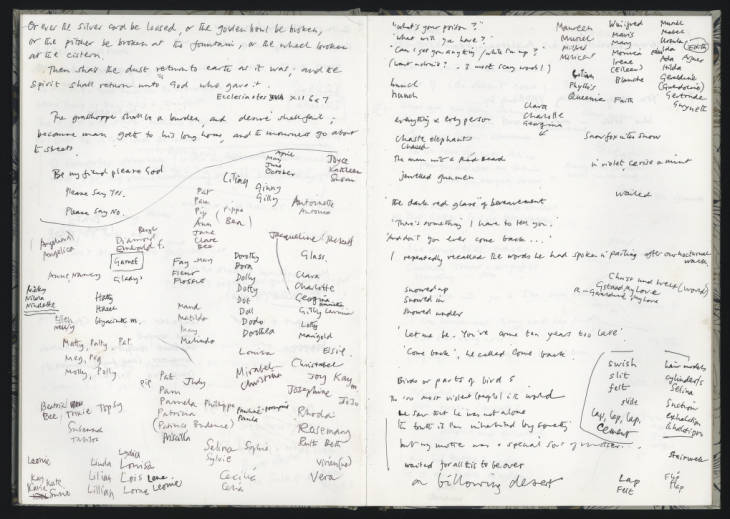
Pages from notebook containing notes relating to draft poems. Hill (Selima) Archive, SH/4/91
Sean O’Brien
Sean O’Brien was born in 1952 in London. He grew up in Hull and was educated at the University of Cambridge.
O’Brien is a poet, critic, anthologist, broadcaster and short fiction writer. He has also written for television and radio.
He has won numerous poetry awards including the Eric Gregory Award (1979), the Somerset Maugham Award (1984) and the Cholmondeley Award (1988). O’Brien is only one of two poets to have won both the T. S. Eliot Prize and the Forward Poetry Prize for the same collection of poems – The Drowned Book. (2007)
He was Writer in Residence at Newcastle Live Theatre between 2001 and 2003 (which he held jointly with the late novelist and poet, Julia Darling) and was Vice President of the Poetry Society. He is currently Professor of Creative Writing at Newcastle University.
O’Brien’s themes include social history, politics and class – written with a mix of detailed realism and dark surrealism.
The Frighteners was published in the aftermath of one of Britain’s most divisive events, the year-long miners’ strike of 1984-85. Not only was there a North–South divide, communities all over the country were torn apart. In this interview, O’Brien discusses his thoughts and experiences of the time and how it influenced The Frighteners.
Development of poems in ‘The Frighteners’. These hand written and annotated versions of the poem Cousin Coat, gives a small insight into O’Brien’s thought process. The words come and go, crossings out made and annotations drawn, highlighting how the poem evolved into the final published version for inclusion in ‘The Frighteners’.
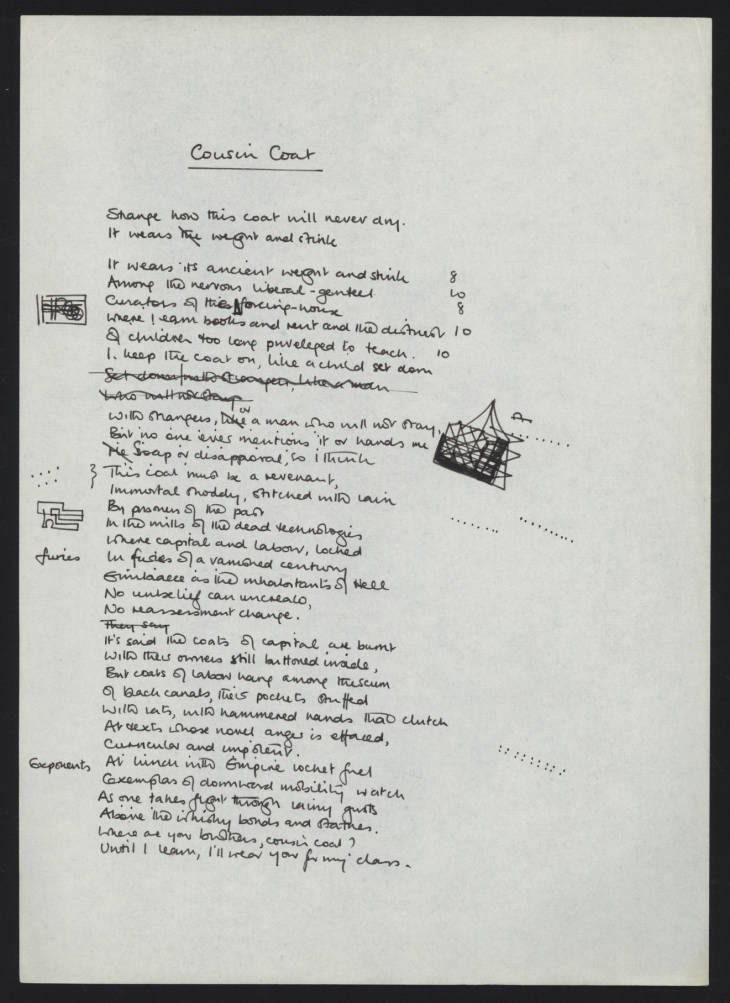
Page from a draft of Cousin Coat, a poem by Sean O’Brien – a hand written manuscript draft of a poem for inclusion in Sean O’Brien’s poetry collection ‘The Frighteners’. O’Brien (Sean) Archive, OBR/1/1/2/4
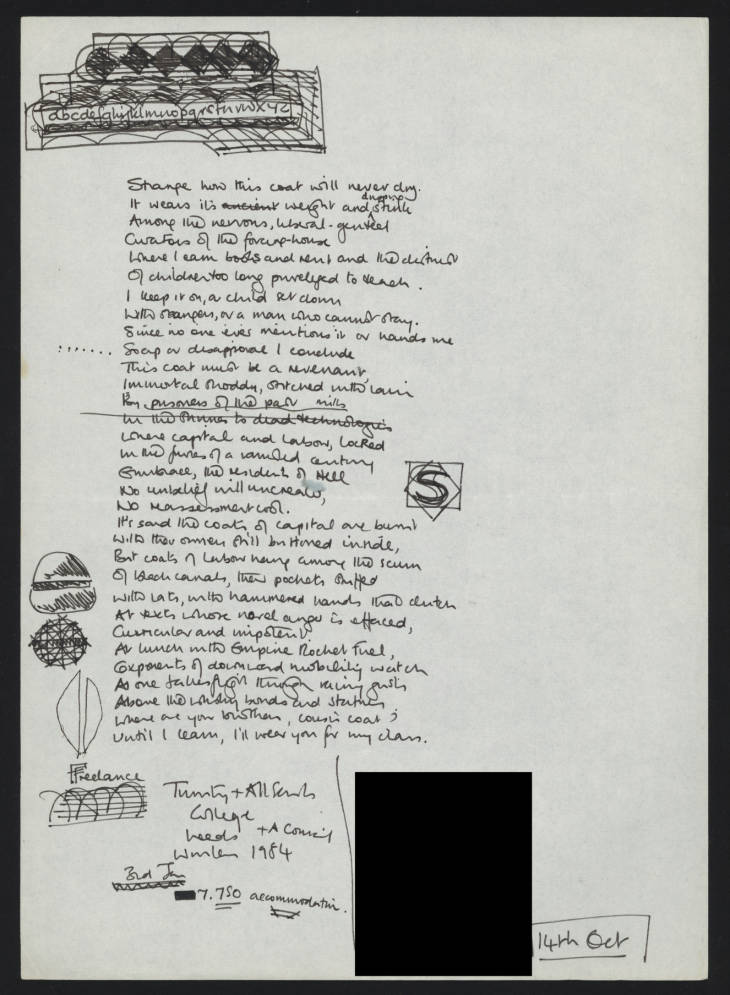
Page from a draft of Cousin Coat, a poem by Sean O’Brien – a hand written manuscript draft of a poem for inclusion in Sean O’Brien’s poetry collection ‘The Frighteners’. O’Brien (Sean) Archive, OBR/1/1/2/4
The exhibition was planned, designed and curated by an MA Art Museum and Gallery Studies placement student.
——————————————————
Find other Literary Archive collections available online on our Collections Guide.
Listen to oral histories with depositors behind our Special Collections and Archives via Collected Voices. These recordings give a privileged insight into creators, collectors and significant figures with close links to the personal and professional activities, borne out through these unique research resources.
Also, explore the Bloodaxe Books Archive and creative responses to it in a variety of innovative ways, online here.

